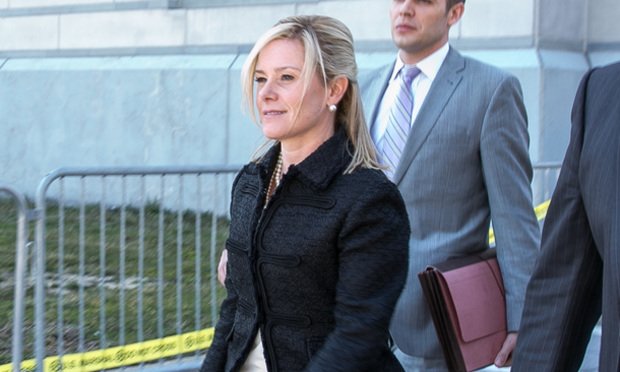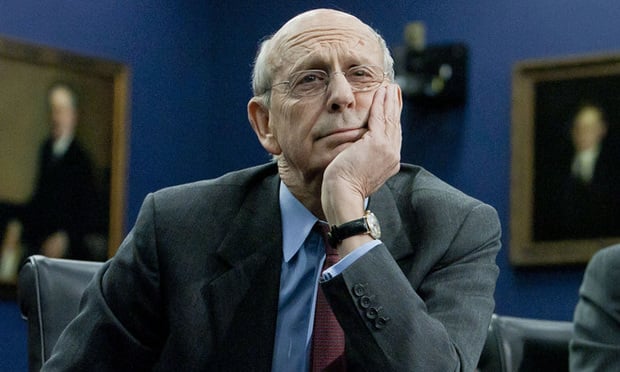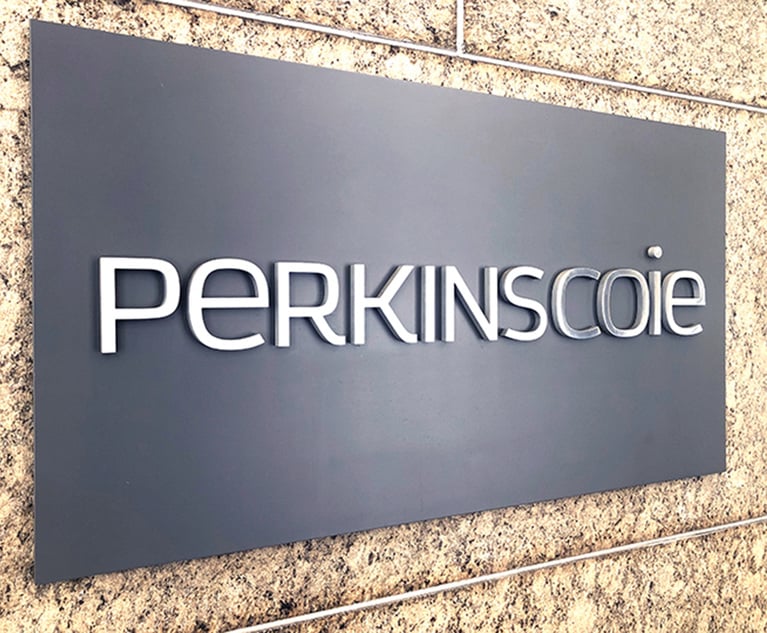'Easy to Make Up Cases There's a Lie in': Justices Question DOJ's 'Bridgegate' Convictions
The case Kelly v. United States could prove another setback for prosecutors at the U.S. Supreme Court.
January 14, 2020 at 01:36 PM
4 minute read
 Bridget Anne Kelly. Photo: Carmen Natale / ALM
Bridget Anne Kelly. Photo: Carmen Natale / ALM
The U.S. Supreme Court on Tuesday appeared skeptical that a federal crime was committed in the so-called Bridgegate scandal in which aides to then-Gov. Chris Christie of New Jersey were accused of orchestrating a massive traffic jam on the George Washington Bridge for political purposes.
The justices heard arguments in the case Kelly v. United States, the latest in a series of cases in which the high court has examined, and limited, the power of federal prosecutors under certain broad criminal statutes.
Bridget Kelly, a former deputy chief of staff to Christie, and William Baroni, then deputy director of the Port Authority, were convicted of federal wire fraud and federal program fraud for conspiring to realign the lanes on the bridge as political payback to the mayor of Fort Lee, New Jersey, who had declined to support Christie's reelection. The lane realignment on the critical thoroughfare caused a four-day traffic jam. A federal appeals court in November largely upheld the convictions.
Eric Feigin, deputy U.S. solicitor general, struggled to persuade a number of justices that the object of the fraudulent scheme was to obtain "property," an element of wire fraud.
"The statute says the object of the scheme has to be to obtain property," Justice Elena Kagan said at one point. "Here the ordinary juror would see the object was to create a traffic problem." Echoing Kagan's concern, Chief Justice John Roberts Jr. told Feigin, "The object was not to change lanes but to create a traffic jam."
Feigin argued the lane realignment "was a particular type of fraud—a commandeering (of the lanes and resources)." He continued: "The object was to take control of real property. It is when the defendant tries to take over property that is in the hands of the victim and manage it as if it is his own property. That's what they were doing with the lanes on the bridge and the employee resources."
 Justice Stephen Breyer testifying in 2015. Photo: Diego M. Radzinschi /ALM
Justice Stephen Breyer testifying in 2015. Photo: Diego M. Radzinschi /ALMJustice Stephen Breyer raised concerns with Feigin and Kelly's counsel, Jacob Roth, partner at Jones Day, that what was actually at the heart of the scandal was more like honest services fraud.
Breyer said during one exchange, "It's easy to make up cases that there's a lie in, and that's my problem, same problem. We're back into honest services fraud, which is fraud and bad. The question is, does this statute get it?"
Roth argued that Port Authority, at most, was deprived of regulatory control, not property.
"The federal property fraud statute is concerned with cheating the government out of its property rights," Roth said. "And that's just not what we have here. What we have here is an abuse of power, a political abuse of power and, if anything, that sounds in honest services fraud which this court has limited, due to vagueness concerns, to bribes and kickbacks."
Sidley Austin partner Michael Levy, counsel to Baroni, told the justices that the government has conceded that a public official who is acting politically, not for personal gain, does not commit fraud by lying about his reason for an official decision if the decision was within his general authority.
"That concession requires reversal," Levy argued. The government, he said, proved that Baroni was responsible for supervising all aspects of Port Authority's operations and there was no policy preventing him from using that authority to alter traffic patterns.
"For the government's rule to work, this court should require an objectively clear lack of authority, something not even arguably shown here," Levy told the justices. "Otherwise, any official who conceals his political motivation risks being convicted of fraud if a prosecutor or jury later disagrees about the scope of his authority."
Christie attended Tuesday's arguments at the Supreme Court. A ruling is expected by the end of June.
Read more:
Sheldon Whitehouse Tells SCOTUS to Preserve Juries as 'Referees of Corruption'
Majority of Baroni and Kelly Convictions Upheld by 3rd Circuit
Trump Court Nominee Grilled Over Ties to Chris Christie, Bridgegate
This content has been archived. It is available through our partners, LexisNexis® and Bloomberg Law.
To view this content, please continue to their sites.
Not a Lexis Subscriber?
Subscribe Now
Not a Bloomberg Law Subscriber?
Subscribe Now
NOT FOR REPRINT
© 2025 ALM Global, LLC, All Rights Reserved. Request academic re-use from www.copyright.com. All other uses, submit a request to [email protected]. For more information visit Asset & Logo Licensing.
You Might Like
View All
Trump's DOJ Delays Releasing Jan. 6 FBI Agents List Under Consent Order
3 minute read
Judge Grills DOJ on Trump’s Birthright Citizenship Executive Order

Perkins Coie Backs Challenge to Trump's Ban on Transgender Military Service
4 minute read
Selendy Gay Files Lawsuit Challenging Trump's Workforce Reclassification EO
2 minute readLaw Firms Mentioned
Trending Stories
- 1ACC CLO Survey Waves Warning Flags for Boards
- 2States Accuse Trump of Thwarting Court's Funding Restoration Order
- 3Microsoft Becomes Latest Tech Company to Face Claims of Stealing Marketing Commissions From Influencers
- 4Coral Gables Attorney Busted for Stalking Lawyer
- 5Trump's DOJ Delays Releasing Jan. 6 FBI Agents List Under Consent Order
Who Got The Work
J. Brugh Lower of Gibbons has entered an appearance for industrial equipment supplier Devco Corporation in a pending trademark infringement lawsuit. The suit, accusing the defendant of selling knock-off Graco products, was filed Dec. 18 in New Jersey District Court by Rivkin Radler on behalf of Graco Inc. and Graco Minnesota. The case, assigned to U.S. District Judge Zahid N. Quraishi, is 3:24-cv-11294, Graco Inc. et al v. Devco Corporation.
Who Got The Work
Rebecca Maller-Stein and Kent A. Yalowitz of Arnold & Porter Kaye Scholer have entered their appearances for Hanaco Venture Capital and its executives, Lior Prosor and David Frankel, in a pending securities lawsuit. The action, filed on Dec. 24 in New York Southern District Court by Zell, Aron & Co. on behalf of Goldeneye Advisors, accuses the defendants of negligently and fraudulently managing the plaintiff's $1 million investment. The case, assigned to U.S. District Judge Vernon S. Broderick, is 1:24-cv-09918, Goldeneye Advisors, LLC v. Hanaco Venture Capital, Ltd. et al.
Who Got The Work
Attorneys from A&O Shearman has stepped in as defense counsel for Toronto-Dominion Bank and other defendants in a pending securities class action. The suit, filed Dec. 11 in New York Southern District Court by Bleichmar Fonti & Auld, accuses the defendants of concealing the bank's 'pervasive' deficiencies in regards to its compliance with the Bank Secrecy Act and the quality of its anti-money laundering controls. The case, assigned to U.S. District Judge Arun Subramanian, is 1:24-cv-09445, Gonzalez v. The Toronto-Dominion Bank et al.
Who Got The Work
Crown Castle International, a Pennsylvania company providing shared communications infrastructure, has turned to Luke D. Wolf of Gordon Rees Scully Mansukhani to fend off a pending breach-of-contract lawsuit. The court action, filed Nov. 25 in Michigan Eastern District Court by Hooper Hathaway PC on behalf of The Town Residences LLC, accuses Crown Castle of failing to transfer approximately $30,000 in utility payments from T-Mobile in breach of a roof-top lease and assignment agreement. The case, assigned to U.S. District Judge Susan K. Declercq, is 2:24-cv-13131, The Town Residences LLC v. T-Mobile US, Inc. et al.
Who Got The Work
Wilfred P. Coronato and Daniel M. Schwartz of McCarter & English have stepped in as defense counsel to Electrolux Home Products Inc. in a pending product liability lawsuit. The court action, filed Nov. 26 in New York Eastern District Court by Poulos Lopiccolo PC and Nagel Rice LLP on behalf of David Stern, alleges that the defendant's refrigerators’ drawers and shelving repeatedly break and fall apart within months after purchase. The case, assigned to U.S. District Judge Joan M. Azrack, is 2:24-cv-08204, Stern v. Electrolux Home Products, Inc.
Featured Firms
Law Offices of Gary Martin Hays & Associates, P.C.
(470) 294-1674
Law Offices of Mark E. Salomone
(857) 444-6468
Smith & Hassler
(713) 739-1250








